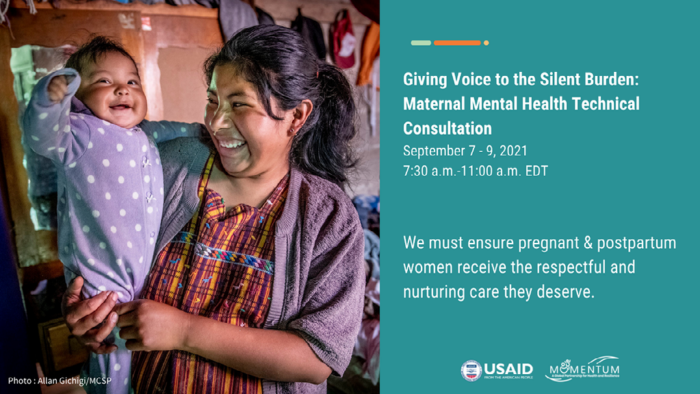Maternal Mental Health: Inequality in Access, Care, and Attention
The mental health of women during the perinatal period impacts women themselves, their children, their families and their communities. But for too long, mental health has been secondary to physical health despite the increasing evidence of the burden of mental health on morbidity and mortality. And the burden is not borne equally. More than 80% of those living with mental health conditions reside in low- and middle-income countries (LMICs)[1] [2], and as many as 90% have no access to treatment.[3] The inequality between countries is reflected as well by inequality within countries – where the risk for mental health conditions varies based on race, ethnicity, age, poverty, urban/rural residence, and social gender norms. And women often bear a disproportionate burden of mental illness, in silence amidst the social expectations that come with being a good mother.

To better understand the current state of maternal mental health, USAID, UNFPA and WHO partnered to host a Maternal Mental Health technical consultation under the theme: ‘’Giving A Voice to the Silent Burden’’. Nearly 600 colleagues from 89 countries visited the platform during the live event. During the over 20 sessions, more than 90 speakers spoke about rigorous research, programmatic approaches, advocacy efforts and unforgettable stories of personal maternal mental health experiences. The consultation was alive with the genuine excitement engendered from people all over the world who are eager to move this agenda forward. This event and conversation align well with the 2021 World Mental Health Day theme: Mental Health in an Unequal World.
The consultation sought to bring together the mental health and maternal health fields to talk about the unique inequities in access, services, and quality for women during the perinatal period, and what we know and don’t know about changing the current status of perinatal mental health for women, their children, and communities. A number of consultation speakers noted that it is time for a paradigm shift – one that recognizes both the central and imperative role of communities and community led interventions, as well as the gendered nature of the risks and consequences associated with maternal mental health issues. A recognition that the biomedical approach to mental health has failed – and the need to look at the community assets, the social and cultural gender norms and the role of poverty and stigma are going to be crucial to address mental health conditions in a sustainable and accessible way. And, the urge to use western created and tested tools and interventions must be resisted.
To address the ever-present needs of perinatal women, locally developed interventions have been introduced and evidence has been generated by and for the communities that need the services and many exciting alliances have been formed. There are interventions using grandmothers, training family mental health therapists and community health workers to provide mental health interventions, linking with faith-based actors and relying on existing platforms for small and sick newborns or nutritional supplementation – all showing success in improving perinatal mental health. The International Conference on Maternal Mental Health in Africa (ICAMMHA) and African Alliance for Maternal Mental Health (AAMMH) are two movements working extremely hard to fight against the burdening effects of poor maternal mental health, and also putting in efforts to educate and inform people on the issue.
There is an increasing amount of attention to the need for contextualized, evidence driven and scalable action that is led by and implemented through communities – with support from the national level down.
The enthusiasm from both the maternal health and mental health worlds was palpable. However, if the statement is true “there is no health without mental health”, and the world is serious about the importance of mental health, reducing the burden and meeting Sustainable Development Goals (SDGs), especially SDG 3 which speaks to ensuring healthy lives and promoting wellbeing for all at all ages, is absolutely necessary. Despite the undeniable mental health impact of a global pandemic, mental health still lags behind. It is time to invest in mental health and specifically maternal mental health in regions with the greatest need.
Shanon McNab, Senior Consultant at USAID’s MOMENTUM Country and Global Leadership; Linos Muvhu, Family Therapist, Secretary and Chief Talent Team Leader at Society for Pre and Post Natal Services (SPANS); Tafadzwa Meki, Mental Health Advocate and Founder of S.A.L.T Africa; Genesis Chorwe, Associate Professor in Mental Health Nursing and Dean of Research at Kamuzu University of Health Sciences
[1] Rathod S, Pinninti N, Irfan M, et al. Mental Health Service Provision in Low- and Middle-Income Countries. Heal Serv Insights. 2017;10. doi:10.1177/1178632917694350
[2] World Health Organization. Mental Health Action Plan 2013-2020. Geneva; 2013. http://www.who.int/iris/handle/10665/89966.
[3] World Health Organization. MhGAP Operations Manual. Geneva: World Health Organization; 2018. http://apps.who.int/bookorders.
